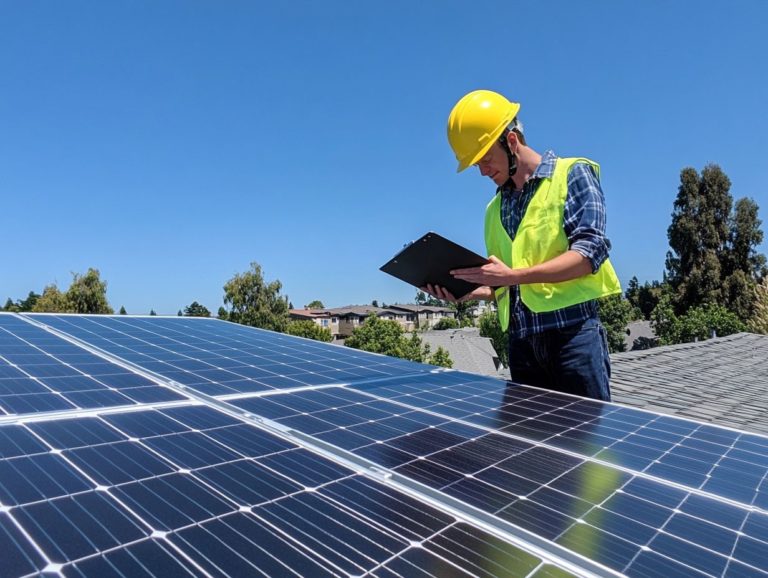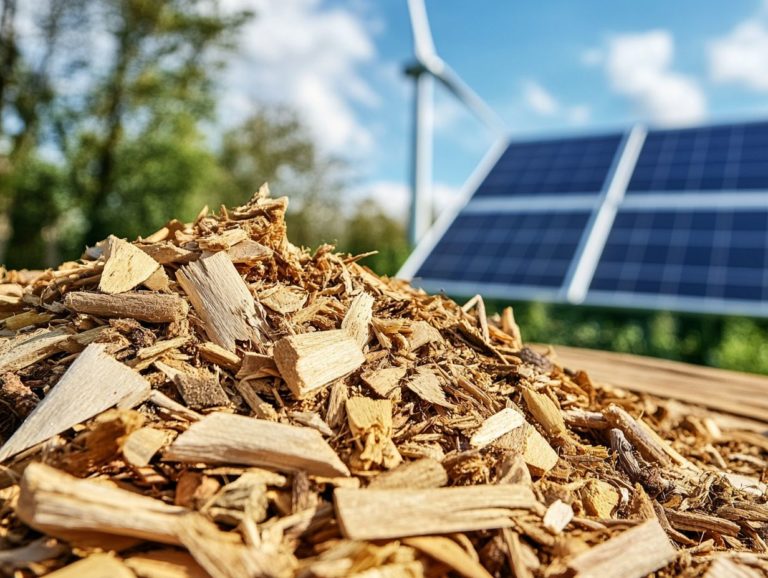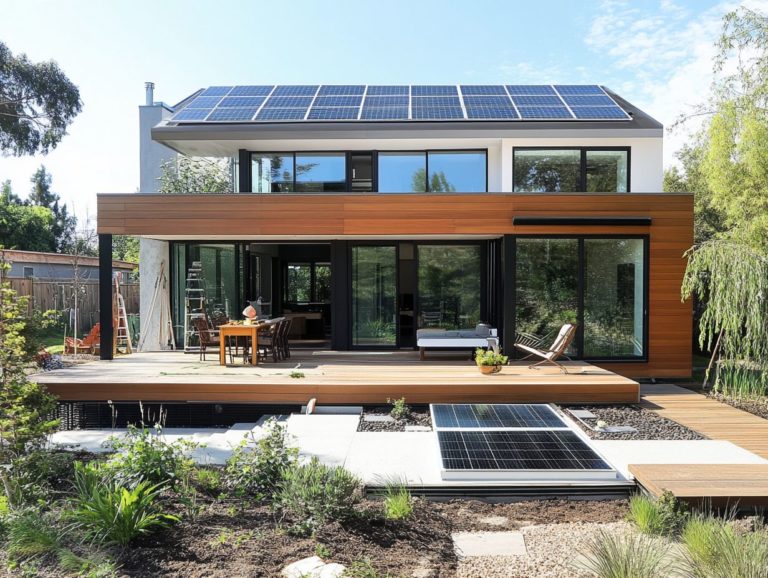What are the Latest Trends in Home Energy?
In today s world, homeowners are becoming energy heroes by enhancing efficiency, cutting costs, and supporting sustainability!
As renewable energy sources such as solar, wind, and geothermal power gain momentum, grasping their benefits becomes essential. When paired with smart home technology, these resources can turn your energy consumption into a more manageable and environmentally friendly venture.
This article delves into the latest trends in home energy, examining their environmental impact and what the future may hold providing practical insights for anyone ready to adopt a greener lifestyle.
Contents
- Key Takeaways:
- Renewable Energy Sources for Homes
- Smart Home Technology and Energy Efficiency
- How Your Energy Choices Affect the Planet
- Future Predictions for Home Energy
- Frequently Asked Questions
- What are the Latest Trends in Home Energy?
- How can smart technology help with home energy consumption?
- Are renewable energy sources becoming more popular for homes?
- What are some examples of energy-efficient appliances for homes?
- How can I incorporate energy-saving practices into my daily routine?
- Can I save money by switching to LED light bulbs?
Key Takeaways:
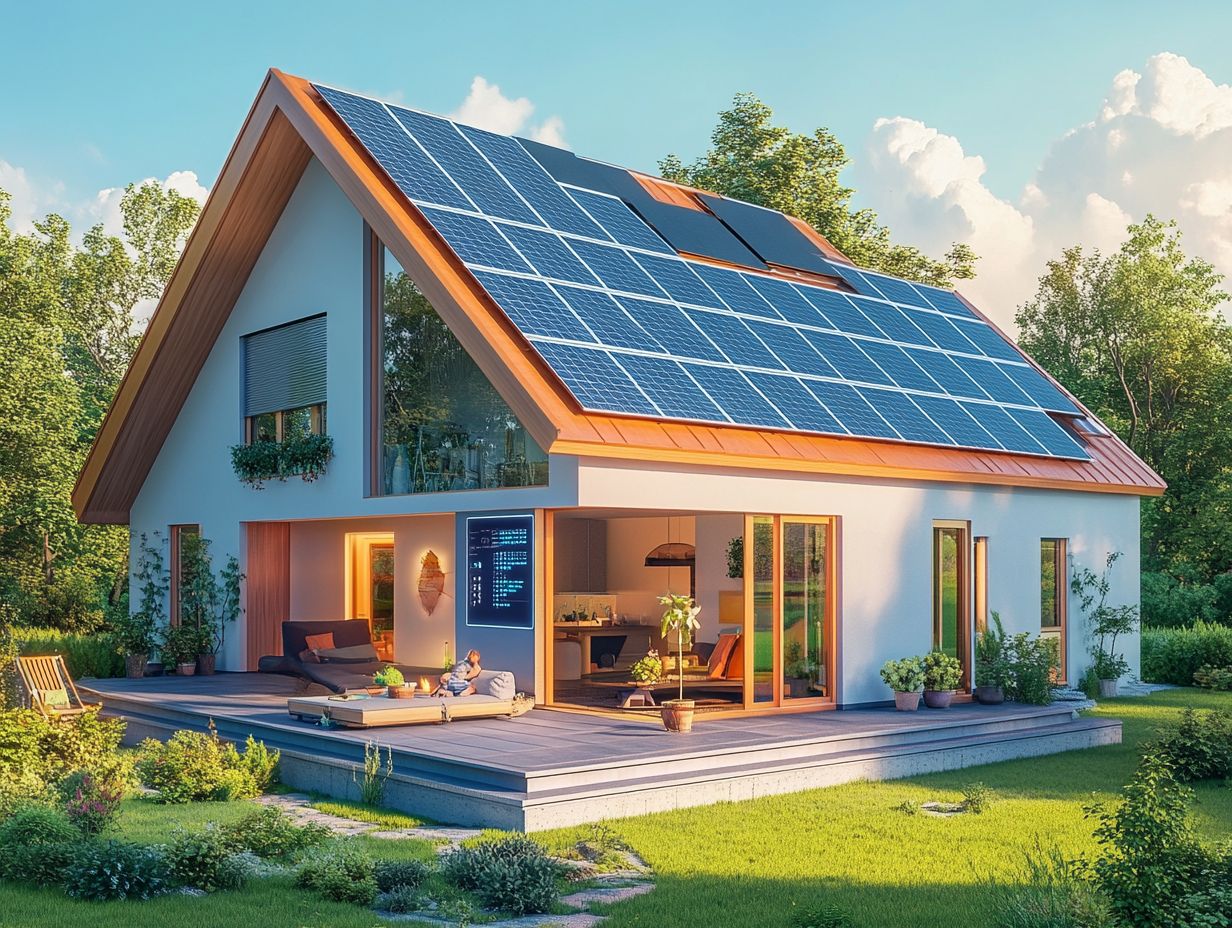
- Renewable energy sources like solar, wind, and geothermal power are becoming increasingly popular for homes, promoting sustainability and reducing carbon footprint.
- Smart home technology, including energy monitoring systems and smart thermostats, can greatly improve energy efficiency and help reduce utility costs.
- With advancements in technology and potential policy changes, the future of home energy looks promising for both homeowners and the environment.
Why is Home Energy Important?
Home energy management is crucial for you as it directly impacts your energy efficiency and cost savings, especially in today’s world of smart home innovations. By effectively managing your energy consumption, you can lower your utility bills and contribute to a more sustainable future by using renewable energy sources like solar and wind power.
With advanced energy tracking technologies, monitoring and optimizing your energy usage has never been more convenient. This sets the stage for greater energy independence and a reduced carbon footprint.
This proactive approach gives you the power to take charge of your energy habits, ensuring that every watt you use aligns with your financial and environmental goals. As energy prices fluctuate, your ability to adapt can bring significant relief to your household budget.
Embracing efficient appliances and systems not only extends the lifespan of your home infrastructure but also helps reduce overall energy demand.
With the integration of smart technology, you can track your consumption in real-time and adjust your usage patterns seamlessly, minimizing waste and reinforcing your commitment to environmental conservation.
Renewable Energy Sources for Homes
Renewable energy sources for your home play a vital role in achieving energy independence and fostering environmental sustainability. By tapping into the power of solar, wind, and geothermal energy, you can substantially reduce your reliance on fossil fuels and minimize your carbon footprint.
As technology advances, the efficiency and affordability of these energy options continue to improve. This makes it more accessible than ever for you to incorporate renewable solutions into your energy management strategies.
Solar Power
Solar power stands out as one of the most sought-after renewable energy sources for homeowners. It allows you to harness sunlight through systems that convert sunlight into electricity to generate your own electricity. The technology has progressed remarkably, making solar power systems increasingly efficient, affordable, and adaptable for residential use.
By investing in solar panels and energy storage solutions, you can significantly reduce your utility bills. You will also contribute to a more sustainable future by lessening your reliance on non-renewable energy sources.
The installation process typically begins with a thorough assessment of your property to determine the best locations for panel placement. This ensures you capture the maximum sunlight year-round. You have a range of solar panel options to consider, including monocrystalline and polycrystalline varieties, each offering unique efficiency rates and cost structures.
Beyond the immediate financial advantages, integrating solar energy systems often boosts your property value. Energy storage solutions, like lithium-ion batteries, allow you to store surplus energy generated on sunny days for use during peak hours or when the sun isn t shining.
This setup not only enhances your energy independence but also aligns with broader sustainable energy management practices. It helps to minimize carbon footprints and promotes environmental stewardship.
Join the movement towards renewable energy today your home and the planet will thank you!
Wind Power
Wind power is an increasingly popular renewable energy source, especially for residential applications in the right locations. By leveraging the capabilities of the wind with turbines, you can generate your own electricity, paving the way for greater energy independence and sustainability.
This clean energy option works beautifully alongside other renewable solutions, creating a comprehensive strategy for energy management and efficiency while significantly cutting down greenhouse gas emissions.
The technology driving wind power generation taps into the kinetic energy of the wind, which is the energy of moving air, causing the blades of the turbines to spin. This activates a generator that transforms that motion into electricity.
When considering installation, you’ll need to think about local wind patterns, zoning regulations, and the potential environmental impact. These factors play crucial roles in determining whether a site is suitable for wind turbines.
Effectiveness can vary greatly depending on where you live, as regions with consistent wind flow will naturally produce more energy. For homeowners, wind turbines ensure a reliable power source for your home and offer the prospect of long-term savings on utility bills, making them an attractive option for anyone interested in sustainable living solutions.
Geothermal Energy
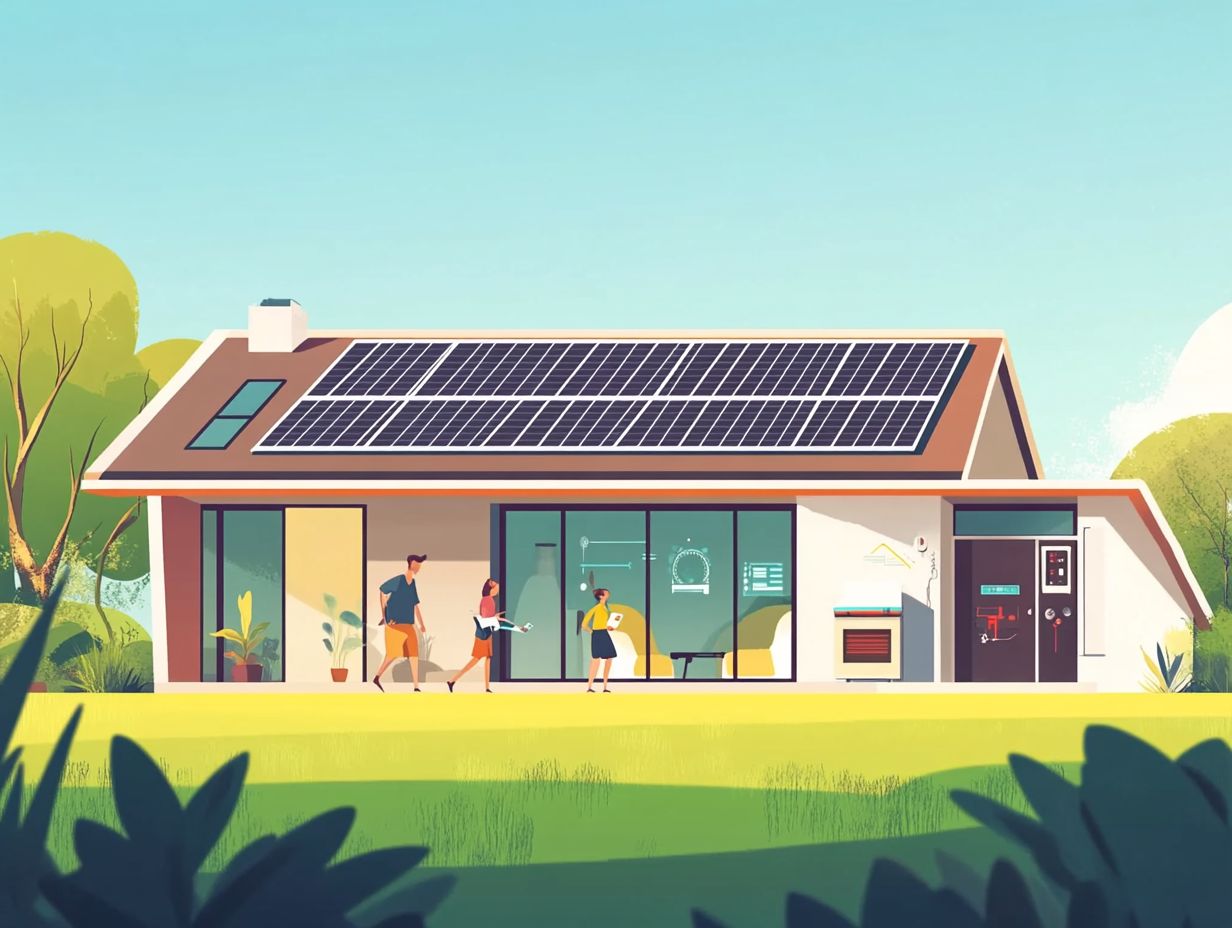
Geothermal energy taps into the Earth’s internal heat, providing you with efficient heating and cooling solutions for your home. It s a smart choice for sustainable electrification, enhancing energy efficiency while reducing your reliance on traditional heating, ventilation, and air conditioning (HVAC) systems.
By investing in geothermal systems, you not only enjoy long-term savings but also play a role in nurturing a greener planet.
But the benefits don’t stop there. Geothermal energy operates through a network of pipes buried underground that move heat to and from the Earth, along with heat pumps that expertly transfer heat, ensuring consistent temperatures throughout the year.
The installation process begins with a comprehensive assessment of your property s geology and climate, allowing for the optimal design and placement of the system.
Once you re all set up, these systems can significantly lower your utility bills, often boasting efficiencies that surpass conventional systems by up to 50%. Plus, integrating geothermal solutions into your existing home energy management systems showcases its flexibility and allure, offering you an eco-friendly route toward energy independence.
Smart Home Technology and Energy Efficiency
Smart home technology signifies a remarkable evolution in energy efficiency, giving you the power to optimize your energy consumption through smart management tools and automation.
By incorporating smart appliances, energy monitoring tools, and artificial intelligence, you can dramatically elevate your energy management strategies. This results in lower utility bills and a diminished environmental footprint.
With these technologies becoming more affordable and accessible, transitioning to an energy-efficient home has never been more attainable.
Energy Monitoring and Management Systems
Smart home technology includes energy monitoring and management systems that give you real-time insights into your energy consumption patterns. These systems allow you to effectively track and analyze energy use, helping you pinpoint areas ripe for improvement and enhance overall efficiency.
By harnessing advanced analytics and insights, you can make informed decisions that optimize your energy usage, leading to both cost savings and a more sustainable lifestyle.
These cutting-edge tools often come equipped with user-friendly interfaces and mobile applications, making it easy for you to monitor your energy habits from anywhere, at any time. With seamless integration capabilities for smart devices, you can effortlessly automate your energy consumption, scheduling high-energy appliances during off-peak hours to trim those utility bills.
Receiving alerts for unusual activity or excessive usage gives you the power to address potential energy waste proactively. Ultimately, these energy monitoring technologies enable you not only to track your consumption but also to adopt greener practices, significantly reducing your carbon footprint.
Smart Thermostats and Appliances
Smart thermostats and appliances stand at the forefront of energy-efficient home management, giving you the power to automate your energy usage and minimize waste.
By learning your preferences and schedules, smart thermostats optimize heating and cooling. Meanwhile, smart appliances enhance overall energy efficiency within your home.
This integration of technology puts you in control of your energy consumption, leading to significant reductions in utility costs and a positive impact on the environment.
Devices like the Nest Learning Thermostat and Ecobee SmartThermostat showcase how smart home technology can intelligently manage your indoor climate. They adjust temperatures based on occupancy and historical data.
Meanwhile, smart appliances such as the Samsung Smart Fridge and LG Smart Oven not only elevate convenience but also offer features like energy monitoring and adaptive settings to reduce power use during peak hours.
These innovations create a seamlessly interconnected home ecosystem. You can monitor and control your energy usage remotely through intuitive smartphone applications, further enhancing your comfort and efficiency.
How Your Energy Choices Affect the Planet
The impact of home energy trends on the environment is profound. By embracing renewable energy sources and energy-efficient practices, you can significantly reduce your household’s carbon footprint.
When you adopt sustainable energy solutions and technologies, you’re not just enhancing your own energy efficiency; you’re also contributing to the broader pursuit of environmental sustainability.
These trends highlight the vital role that homes play in the transition toward a greener future, emphasizing the importance of working together for real change.
Why Reducing Your Carbon Footprint Matters
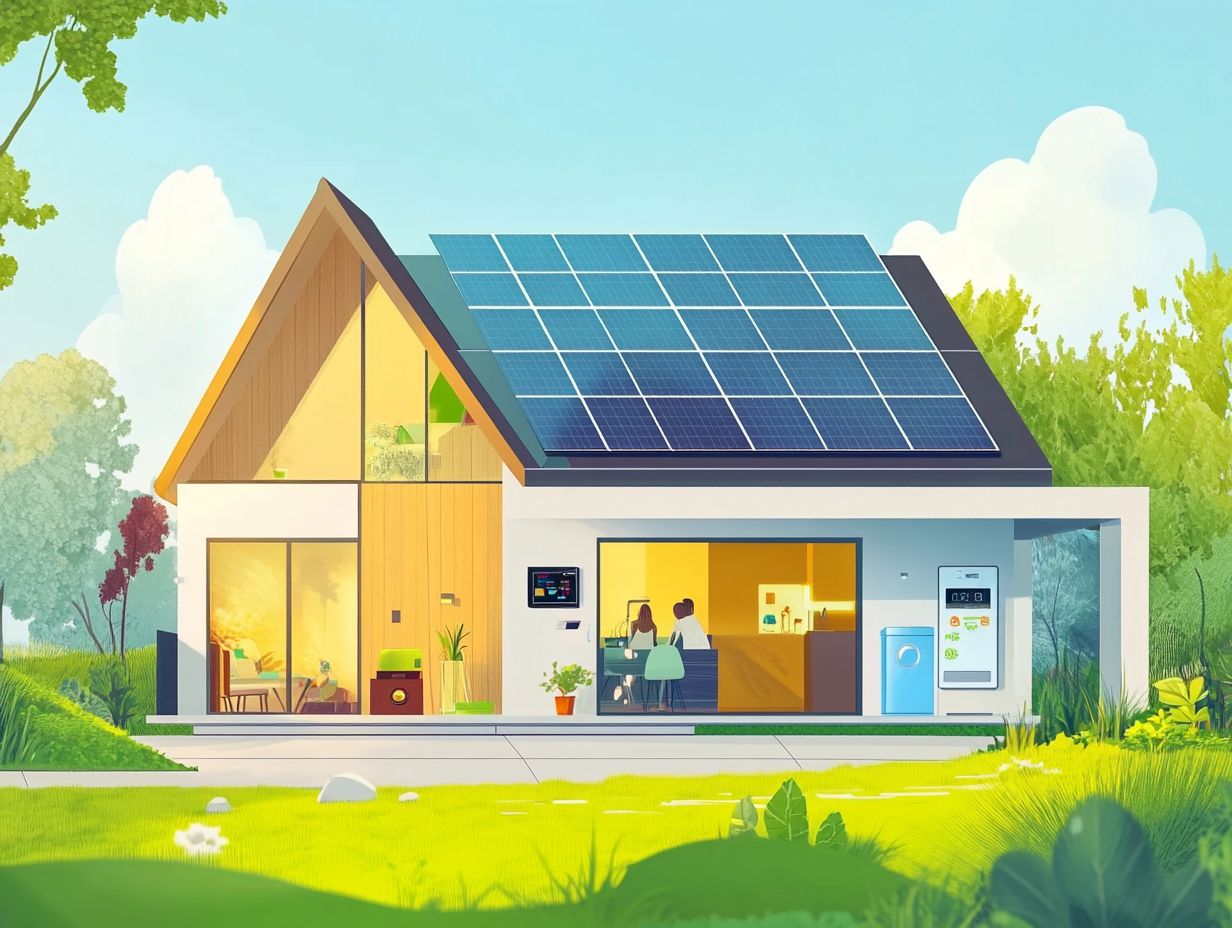
Reducing your carbon footprint is a primary objective in modern energy management practices. You can achieve this by embracing renewable energy sources and smart home technology.
By integrating energy-efficient solutions and sustainable practices, you have the power to significantly reduce your greenhouse gas emissions. This collective effort fosters a healthier planet and sets a remarkable standard for future generations.
Take charge of your energy consumption today! By combining strategies like installing solar panels, utilizing energy-efficient appliances, and incorporating smart thermostats, you can transform your energy usage.
With advanced monitoring systems, you’ll gain access to real-time data, giving you the power to make informed decisions about your energy usage.
Exploring community renewable initiatives and understanding energy credits can amplify your efforts to create a more sustainable environment. Embracing these innovative solutions diminishes your reliance on fossil fuels and nurtures a more environmentally conscious lifestyle.
Promoting Sustainability
Promoting sustainability through home energy management is essential for fostering environmentally friendly practices. By embracing renewable energy solutions and smart technologies, you can enhance your energy efficiency while contributing to a sustainable future.
This transition benefits the environment and inspires your community to engage in energy-efficient practices and sustainable living.
Consider utilizing solar panels or wind turbines; these options harness natural energy sources that significantly lower your carbon footprint.
Meanwhile, smart home devices optimize your energy consumption by adjusting usage based on real-time data. Such innovations create a ripple effect, encouraging neighbors and local businesses to adopt similar sustainable measures.
By embracing these technologies, you can gain substantial cost savings on energy bills over time. Sustainability becomes not just an ethical choice, but a financially savvy one as well.
As more individuals like you take these steps, collective efforts pave the way toward a greener, more optimistic future. Act now to make a difference!
Future Predictions for Home Energy
Future predictions for home energy management look exceptionally promising, fueled by technological advancements and evolving policies that champion sustainability.
As innovations in smart home technologies, renewable energy solutions, and energy management systems continue to progress, you will find yourself equipped with increasingly effective tools to optimize your energy efficiency.
Policy improvements will actively promote the adoption of clean energy practices, setting the stage for a greener, more sustainable future in your home.
Technological Advancements
Technological advancements are fundamentally transforming the future of home energy management. This transformation is especially evident through the rise of smart home technology, innovative energy storage solutions, and cutting-edge artificial intelligence.
These developments present exceptional opportunities for optimizing energy efficiency, enhancing home convenience, and elevating your overall user experience. As these technologies evolve, you can anticipate a seamless integration of energy management systems that offer both convenience and sustainability.
Consider smart thermostats and connected appliances that automatically adjust their energy consumption based on real-time data and your preferences, significantly minimizing waste. Energy storage solutions, like advanced battery systems, empower you to capture solar energy for later use, ensuring a reliable power supply when you need it most. For a deeper understanding of this topic, explore the future of home energy efficiency solutions.
Meanwhile, artificial intelligence algorithms analyze your consumption patterns, predicting your energy needs and optimizing costs with precision. Together, these advancements foster a greener environment and provide you with the tools to take unprecedented control over your energy usage.
Policy Changes and Regulations
Policy changes and regulations play a pivotal role in shaping the home energy management landscape, especially in promoting renewable energy and sustainable practices. As governments increasingly recognize the necessity of reducing carbon emissions and enhancing energy efficiency, they are rolling out policies that incentivize the adoption of clean energy technologies.
A range of incentives, such as tax credits, rebates, and grants, encourages you to invest in solar panels, energy-efficient appliances, and smart home technologies. These financial benefits alleviate the initial installation costs, making renewable energy solutions more accessible.
Mandates requiring a percentage of energy from renewable sources compel utilities to innovate, cultivating an environment where sustainable energy practices can truly thrive.
Ultimately, the synergy between these policies and your engagement as a homeowner is paving the way for a comprehensive shift towards a resilient energy system.
Frequently Asked Questions
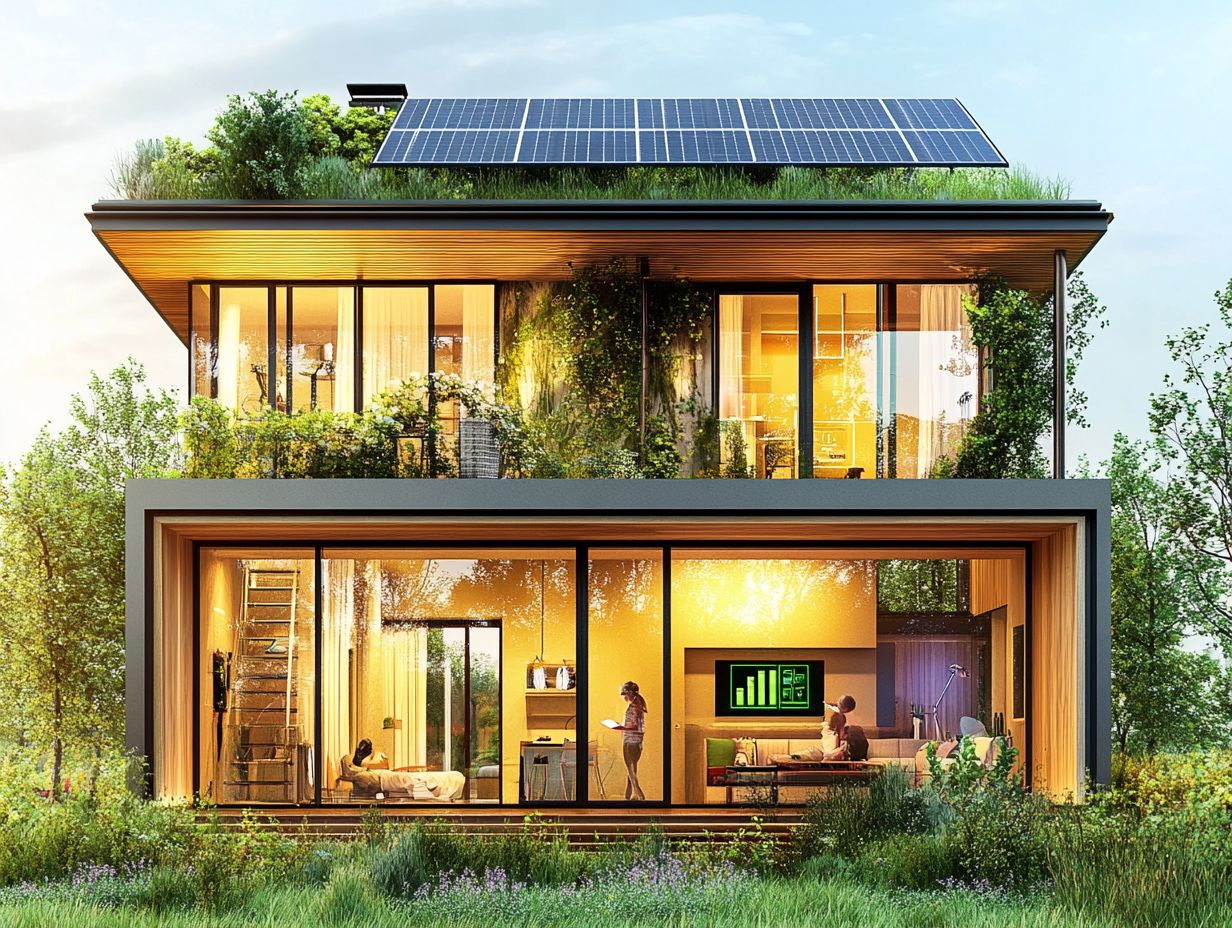
What are the Latest Trends in Home Energy?
The latest trends in home energy include the use of smart technology, renewable energy sources, and energy-efficient appliances.
How can smart technology help with home energy consumption?
Smart technology, such as smart thermostats and lighting, can monitor and adjust energy usage to optimize efficiency and save costs.
Are renewable energy sources becoming more popular for homes?
Yes, solar panels and wind turbines are now more affordable and accessible for homeowners looking to reduce their carbon footprint and energy bills.
What are some examples of energy-efficient appliances for homes?
Energy Star certified refrigerators, washing machines, and dishwashers use significantly less energy than traditional models.
How can I incorporate energy-saving practices into my daily routine?
Simple habits like turning off lights when leaving a room, unplugging electronics when not in use, and using natural light can help reduce home energy consumption.
In conclusion, embracing energy-efficient technologies and policies can significantly enhance your home’s sustainability. Explore the options available to make a positive impact today!
Can I save money by switching to LED light bulbs?
Absolutely! LED light bulbs can save you money.
They use up to 75% less energy compared to old-style light bulbs and last up to 25 times longer!

